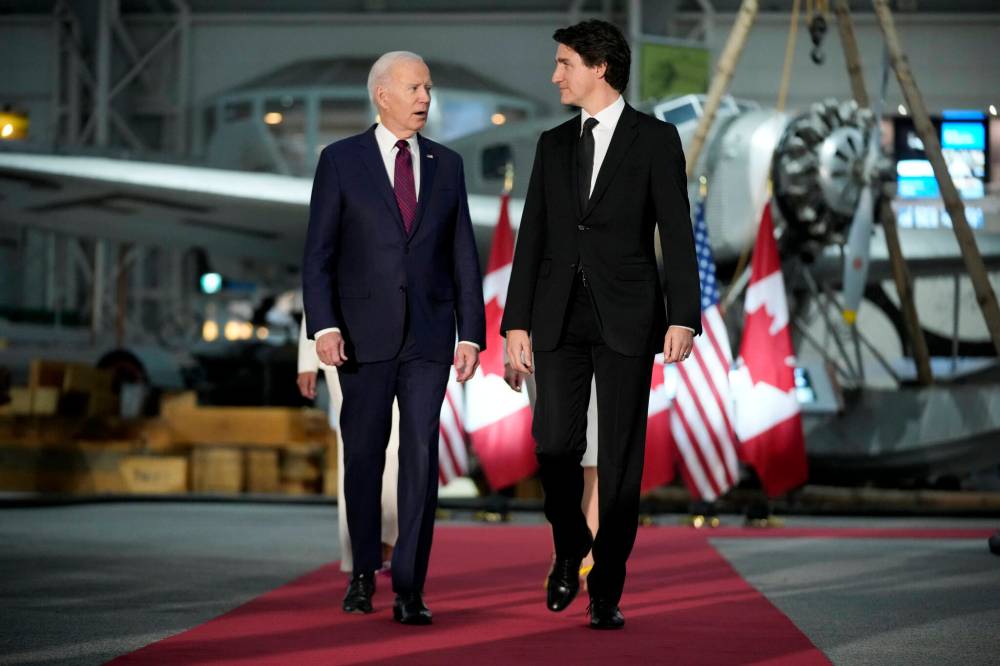China concerns shape Canada-U.S. roadmap
Read this article for free:
or
Already have an account? Log in here »
To continue reading, please subscribe:
Monthly Digital Subscription
$1 per week for 24 weeks*
- Enjoy unlimited reading on winnipegfreepress.com
- Read the E-Edition, our digital replica newspaper
- Access News Break, our award-winning app
- Play interactive puzzles
*Billed as $4.00 plus GST every four weeks. After 24 weeks, price increases to the regular rate of $19.95 plus GST every four weeks. Offer available to new and qualified returning subscribers only. Cancel any time.
Monthly Digital Subscription
$4.99/week*
- Enjoy unlimited reading on winnipegfreepress.com
- Read the E-Edition, our digital replica newspaper
- Access News Break, our award-winning app
- Play interactive puzzles
*Billed as $19.95 plus GST every four weeks. Cancel any time.
To continue reading, please subscribe:
Add Free Press access to your Brandon Sun subscription for only an additional
$1 for the first 4 weeks*
*Your next subscription payment will increase by $1.00 and you will be charged $16.99 plus GST for four weeks. After four weeks, your payment will increase to $23.99 plus GST every four weeks.
Read unlimited articles for free today:
or
Already have an account? Log in here »
Hey there, time traveller!
This article was published 27/03/2023 (1065 days ago), so information in it may no longer be current.
Prime Minister Justin Trudeau and U.S. President Joe Biden last week sharpened their shared complaints about China. Their revised roadmap for the Canada-U.S. partnership, issued last Friday at the end of Mr. Biden’s Ottawa visit, brings new attention to economic competition with China, “foreign interference in our societies” and the maintenance of peace between China and Taiwan.
Two years ago, Mr. Trudeau and the newly inaugurated Mr. Biden referred to China in the first version of their joint roadmap. They complained of China’s coercive and unfair trade practices, non-market practices and human rights abuses. They hoped to co-operate with China on climate change.
Last week, they revised their roadmap. To last year’s list, they added a shared commitment to competing with China on a level playing field. They also promised to co-operate on “countering foreign interference in our societies in a manner that reflects our shared democratic values.”
Mr. Trudeau has been sharply criticized for tolerating too easily reported efforts by Chinese consular officials to organize Chinese Canadians into a focused voting bloc in Canadian elections. He is awaiting advice from former governor-general David Johnston on a possible inquiry into foreign interference.
Mr. Trudeau has been sharply criticized for tolerating too easily reported efforts by Chinese consular officials to organize Chinese Canadians into a focused voting bloc in Canadian elections.
Last week’s meeting with Mr. Biden should encourage Mr. Trudeau to pay close attention when Canadian intelligence services tell him agents of the Chinese government are mobilizing a voting bloc. The United States is facing the same problem.
The joint statement of the two leaders sends a signal through their agencies to keep an eye out for election interference. It alerts U.S. agencies to let the Canadians know if they pick up indications of foreign electoral monkey business in Canada. It alerts Canadian agencies to do the same when they get hints the Americans might like to know about.
The revised roadmap also brings Taiwan into the discussion of Canada-U.S. views of China. Chinese President Xi Jinping has increasingly insisted on the importance of annexing Taiwan to mainland China, bringing it under the rule of China’s Communist government.
What exactly Mr. Biden would do if China increased its military pressure on Taiwan remains a mystery. Canada is unlikely to contribute much to the military defence of the island nation in the event of a Chinese expedition across the Taiwan Strait.
Andrew Harnik / The Canadian Press U.S. President Joe Biden met with Prime Minister Justin Trudeau in Canada last week.
Canada has been helpful in the past in nurturing relations between China and the U.S. In the time of former prime minister Pierre Trudeau, Canada and China together found the form of words that allowed this country to establish diplomatic ties with China without endorsing the Chinese view that Taiwan belongs to them. That bit of verbal gymnastics opened the way for establishment of diplomatic relations between China and the U.S.
That was half a century ago, when China was a poor country with little to sell the world, no presence in the United Nations and no military capacity to speak of. China today is a mighty industrial machine with economic tentacles reaching across Asia and armed force that might be able to seize Taiwan.
The new Canada-U.S. roadmap shows the two countries are worried about China’s recurring threats to invade Taiwan. They are not making any military counter-threats of their own. They do, however, want somebody to maintain peace and stability across the Taiwan Strait. Canada and the U.S. should be as eager to uphold independence for Taiwan as they are for Ukraine.













